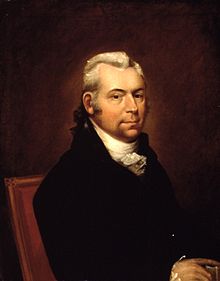Gideon Granger
| Gideon Granger | |
|---|---|
 |
|
| 4th United States Postmaster General | |
|
In office November 28, 1801 – March 17, 1814 |
|
| President |
Thomas Jefferson James Madison |
| Preceded by | Joseph Habersham |
| Succeeded by | Return J. Meigs, Jr. |
| Personal details | |
| Born |
July 19, 1767 Suffield, Connecticut, U.S. |
| Died | December 31, 1822 (aged 55) Canandaigua, New York, U.S. |
| Political party | Democratic-Republican |
| Spouse(s) | Mindwell P. Granger |
| Alma mater | Yale University |
| Profession | Politician, Lawyer |
Gideon Granger (July 19, 1767 – December 31, 1822) was an early American politician and lawyer. He was the father of Francis Granger.
Born in Suffield, Connecticut, Granger attended and graduated from Yale University and became a lawyer. He was considered a brilliant political essayist. Using the pseudonyms Algernon Sydney and Epaminondas many of his writings, defending Jeffersonian principles, were published in many pamphlets.
He was a member of the Connecticut House of Representatives and ran unsuccessfully for the United States Congress in 1798. A staunch supporter of Thomas Jefferson's, Granger was appointed as Postmaster General at the start of his term in 1801. He served in this post until 1814 when Jefferson's successor, James Madison, replaced him. He is the longest serving Postmaster General as of 2015.
After leaving Washington, D.C., Granger settled in Canandaigua, New York, where he built a homestead that would be "unrivaled in all the nation" from which he could administer the many land tracts he had acquired further to the west. Today his home is a museum. He became a member of the New York Senate and continued to be influential in politics and law including being a key figure in the Erie Canal project.
Ill health forced him to retire early in 1821 and he died the next year on December 31, 1822. He was interred in Woodlawn Cemetery in Canandaigua. Granger is the namesake of Granger Township, Ohio.
...
Wikipedia
